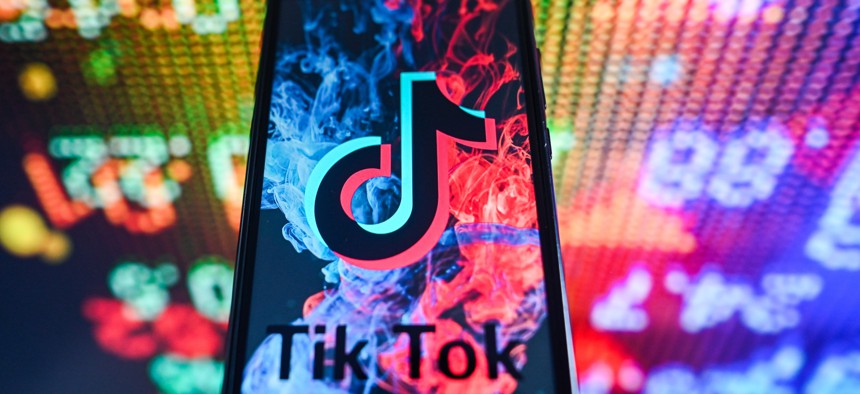Government contractors grapple with enforcement challenges of TikTok ban

Industry groups are asking for more clarity and raising potential issues about an interim rule to ban TikTok on contractors' mobile devices. SOPA Images / Getty Images
Industry groups are raising censorship and privacy concerns over a ban of popular social media app TikTok on devices used by government contractors.
Industry groups have expressed privacy and censorship concerns over a federal ban that prohibits government contractors from using the TikTok social media app on covered devices, while warning that monitoring compliance and implementation could prove difficult for many organizations.
In response to a new interim rule published by the Federal Acquisition Regulation, the Professional Services Council appeared to question the appropriateness of prohibiting applications like TikTok on employee-owned devices "given privacy and censorship concerns as well as on-going legal challenges to the prohibition at it pertains to private (i.e., non-government) devices."
The proliferation of "Bring Your Own Device" policies and programs among government contractors throughout the COVID-19 pandemic could further complicate the enforcement of the ban, PSC said in its comments. The trade association also requested clarity on what devices fall under the interim rule, writing: "Does this prohibition apply to employee-owned devices for only those contractor employees who work directly on the contract? What about back-office, contract support or indirect staff?"
The Coalition for Government Procurement expressed similar sentiments in its response to the interim rule, urging the federal government to amend the rule "to account for the practical realities faced by some firms.
"Despite best efforts, some companies technically may not be capable of ensuring full compliance with the prohibition," the organization wrote.
The coalition also refuted the FAR Council's assertion that the new rule would not pose a significant economic impact on businesses, noting that the rule could potentially end BYOD programs among government contractors and "may represent a significant expense, especially for small and/or disadvantaged businesses," which would then have to provide their employees with IT and mobile devices.
TikTok pushed back against the prohibition in its own comments to the interim rule, saying its parent company ByteDance "has implemented sophisticated safeguards designed to thwart influence by third parties" and has committed to "remain a platform for free expression and will not be manipulated by any government.
"Overly conservative interpretations of the interim rule could force many employees who work for contractors or subcontractors to delete the application from their devices unnecessarily," the company wrote, noting how nearly 80% of U.S.-based companies have implemented BYOD programs since 2018.
The Department of Defense, the General Services Administration and NASA issued the interim rule banning the use or installation of TikTok on devices used by government employees and contractors in June. The rule applies to any devices that are used "to a significant extent" in the performance of a contract, including computers, software and mobile devices.
The Information Technology Industry Council said that the rule is "ambiguous in terms of defining when information technology is subject to the prohibition," adding: "There is considerable confusion by stakeholders regarding whether certain use cases would be considered significant in terms of being necessary to directly engage in the performance of the scope of work under a federal contract."
The FAR Council will review comments submitted to the Regulatory Secretariat Division while creating the final rule. The federal government has not indicated when a final rule will be issued.



